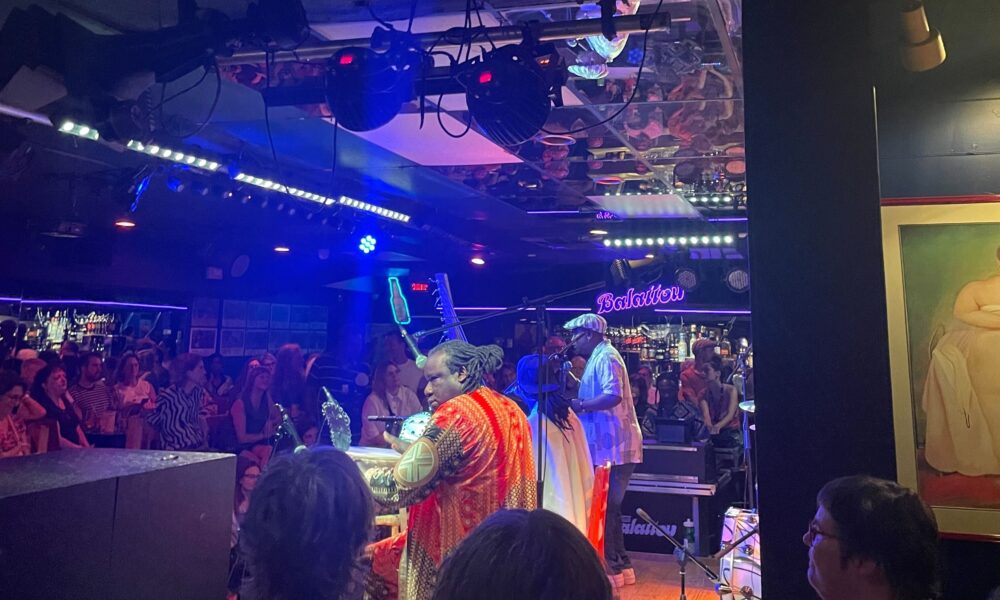With summer drawing to a close, one festival remains a highlight of the season. For nearly two weeks in July, the streets of Montreal pulsed with the rhythms of distant homelands. From July 8 to 20, the city became the summer’s cultural epicenter, hosting the highly anticipated Festival International Nuits d’Afrique. This annual event celebrates the musical heritage of Africa, the Caribbean, and Latin America by bringing together artists from around the world to perform in the heart of the city. Organized by Productions Nuits d’Afrique, the festival seeks to share the diverse cultural legacies of these regions with Québec, Canada, and the world beyond.
The festival’s performances spanned a variety of venues across the city, including outdoor stages, concert halls, and private clubs. One of the most outstanding was Noumoucounda Cissoko’s intimate performance at Club Balattou. A staple in Montreal’s world music scene for over 35 years, the venue is known as the ‘base camp’ of the festival. It’s a must-visit spot for anyone passionate about global musical traditions.
Noumoucounda Cissoko is a master of the kora, a 21-stringed harp-lute central to West African music. From a young age, Cissoko was steeped in the griot tradition of his native Senegal, where storytellers have passed down oral histories through music for centuries. The kora—which is more than an instrument—serves as a vessel for these oral histories, making Cissoko both a musician and a modern-day griot. His mastery of the kora allows him to narrate the political, social, and cultural history of Senegal through song.
Cissoko’s sound is a powerful blend of traditional Senegalese rhythms and modern influences, creating a rich, evocative atmosphere that felt both ancient and immediate. His music is at once rhythmic and meditative; fluid arpeggios ripple out from the kora, cascading like water over a shifting bed of jazz, hip hop, and reggae-inflected beats. Each pluck of the strings carries a silken clarity, while layered percussion and subtle electronic textures give his sound weight and momentum. The music wasn’t just beautiful; it was charged. The audience could sense the tension between past and present, between preservation and change, vibrating in every rhythm. It was as if Cissoko was translating something too complex for words—something political, personal, and profoundly human.
This engagement is especially evident in his 2019 album Noumoukan Wilila, a deeply intimate project that explores ideas of development, education, and the role of women in African societies. Through this work, Cissoko broadens the scope of his griot lineage, amplifying stories that are often unheard—particularly those of women whose voices have been historically marginalized. The album advocates for gender equity and access to education as essential components of progress, framing these not just as social issues but as cultural imperatives. Tracks from the album range from delicate, introspective solos to expansive, groove-driven arrangements, always centered on the fluid, expressive voice of the kora.
Through his kora, Cissoko doesn’t just preserve his ancestors’ stories; he reinterprets them for a modern audience, layering traditional melodies with modern rhythms and lyrics that speak to today’s challenges. In doing so, he bridges generations, honouring the past while actively participating in the cultural conversations of the current moment.
Noumoucounda Cissoko’s artistry is a testament to the enduring power of cultural expression. His performance during the Festival International Nuits d’Afrique offered a rare chance to engage directly with the musical roots and living traditions of Senegal. Cissoko is more than a musician: He is a storyteller, a keeper of history, and a cultural commentator whose music bridges the past with the present.
Festival International Nuits d’Afrique ran from July 8 to 20 at various venues across Montreal. For details about the event or its upcoming edition, visit the official website.









